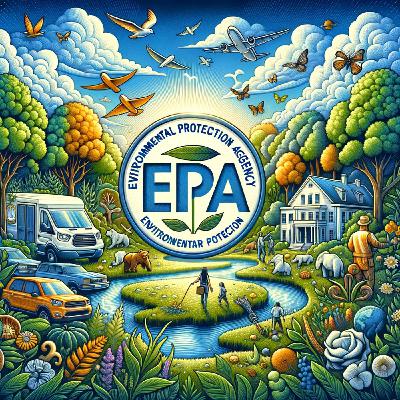EPA's Biggest Deregulation Day: Rollback of Climate Rules Sparks Debate
Update: 2025-10-24
Description
This week’s biggest headline from the Environmental Protection Agency is the announcement of a sweeping deregulatory initiative by Administrator Lee Zeldin, described by the EPA as the “biggest deregulation day in US history.” The agency says it plans to move forward with 31 historic actions that reexamine or repeal regulations on water, air, and climate, and overhaul industry oversight, marking a dramatic shift in federal environmental policy.
At the heart of these changes is the proposed repeal of greenhouse gas emissions standards for fossil fuel-fired power plants and vehicles. On June 17, the EPA moved to rescind both the Obama-era Clean Power Plan rules and the Biden-era Carbon Pollution Standards for electricity generation. Beginning in August, the EPA also opened public comment on repealing the landmark 2009 Endangerment Finding, the legal basis for regulating greenhouse gases under the Clean Air Act. Critics argue that pulling this foundation could undercut the EPA’s core mission of controlling emissions and protecting public health, especially since the transportation sector alone makes up nearly 29 percent of US greenhouse gas emissions, according to official EPA statistics.
Industry advocates see these moves as reducing regulatory burdens and boosting domestic energy, while environmental groups warn of backsliding on climate progress and health protections. Businesses in the traditional energy sector may benefit from fewer compliance hurdles and reduced costs, but many companies focused on clean energy and emissions technology face increased uncertainty. State and local governments, especially in states with robust clean air laws like California, have sounded alarms about the risk these changes pose for meeting their own ambitious targets—pointing to federal actions that undermine state-led efforts.
There’s also a direct human angle. EPA just announced an action plan to address drinking water contamination at a Superfund site in New Hampshire, focusing on real-world risks and safeguards for affected families. This reminds all listeners that, even as national policies shift, the EPA remains engaged at ground level in local communities dealing with contamination and environmental emergencies.
Several deadlines loom ahead. The window for public comment on the Endangerment Finding repeal remains open into November, and citizen input could play a major role in shaping the final decision. As Administrator Zeldin said earlier this week, “We are committed to returning regulatory authority to states and empowering American industry, while upholding our obligation to protect air and water quality.”
As we look forward, watch for pending final actions on greenhouse gas reporting program changes and court challenges expected from states and advocacy groups. Listeners interested in having their voice heard on these proposed changes should visit the official EPA website to submit comments and learn more about the public docket numbers attached to each rule.
Thanks for tuning in for this week’s episode. Stay up to date by subscribing to the podcast and keeping an eye on upcoming public comment deadlines—a critical way for you to help shape environmental policy. This has been a Quiet Please production, for more check out quietplease dot ai.
For more http://www.quietplease.ai
Get the best deals https://amzn.to/3ODvOta
This content was created in partnership and with the help of Artificial Intelligence AI
At the heart of these changes is the proposed repeal of greenhouse gas emissions standards for fossil fuel-fired power plants and vehicles. On June 17, the EPA moved to rescind both the Obama-era Clean Power Plan rules and the Biden-era Carbon Pollution Standards for electricity generation. Beginning in August, the EPA also opened public comment on repealing the landmark 2009 Endangerment Finding, the legal basis for regulating greenhouse gases under the Clean Air Act. Critics argue that pulling this foundation could undercut the EPA’s core mission of controlling emissions and protecting public health, especially since the transportation sector alone makes up nearly 29 percent of US greenhouse gas emissions, according to official EPA statistics.
Industry advocates see these moves as reducing regulatory burdens and boosting domestic energy, while environmental groups warn of backsliding on climate progress and health protections. Businesses in the traditional energy sector may benefit from fewer compliance hurdles and reduced costs, but many companies focused on clean energy and emissions technology face increased uncertainty. State and local governments, especially in states with robust clean air laws like California, have sounded alarms about the risk these changes pose for meeting their own ambitious targets—pointing to federal actions that undermine state-led efforts.
There’s also a direct human angle. EPA just announced an action plan to address drinking water contamination at a Superfund site in New Hampshire, focusing on real-world risks and safeguards for affected families. This reminds all listeners that, even as national policies shift, the EPA remains engaged at ground level in local communities dealing with contamination and environmental emergencies.
Several deadlines loom ahead. The window for public comment on the Endangerment Finding repeal remains open into November, and citizen input could play a major role in shaping the final decision. As Administrator Zeldin said earlier this week, “We are committed to returning regulatory authority to states and empowering American industry, while upholding our obligation to protect air and water quality.”
As we look forward, watch for pending final actions on greenhouse gas reporting program changes and court challenges expected from states and advocacy groups. Listeners interested in having their voice heard on these proposed changes should visit the official EPA website to submit comments and learn more about the public docket numbers attached to each rule.
Thanks for tuning in for this week’s episode. Stay up to date by subscribing to the podcast and keeping an eye on upcoming public comment deadlines—a critical way for you to help shape environmental policy. This has been a Quiet Please production, for more check out quietplease dot ai.
For more http://www.quietplease.ai
Get the best deals https://amzn.to/3ODvOta
This content was created in partnership and with the help of Artificial Intelligence AI
Comments
In Channel





